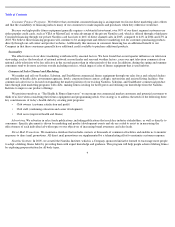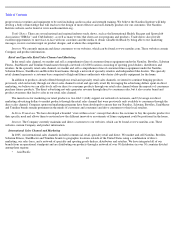Nautilus 2005 Annual Report Download - page 20
Download and view the complete annual report
Please find page 20 of the 2005 Nautilus annual report below. You can navigate through the pages in the report by either clicking on the pages listed below, or by using the keyword search tool below to find specific information within the annual report.
Table of Contents
Our future integration efforts may be jeopardized, and our actual return on investment from such acquisitions may be lower than
anticipated, as a result of various factors, including the following:
•
Challenges in the successful integration of the products, services or personnel of the acquired business into our operations;
•
Loss of employees or customers that are key to the acquired business;
•
Time and money spent by our management team focusing on the integration, which could distract it from our core operations;
•
Our potential lack of experience in markets of the acquired businesses;
•
Possible inconsistencies in standards, controls, procedures and policies among the combined companies and the need to implement
our financial, accounting, information and other systems; and
Our failure or inability to protect our intellectual property could significantly harm our competitive position.
•
The need to coordinate geographically diverse operations.
Protecting our intellectual property is an essential factor in maintaining our competitive position in the health and fitness industry. If we
do not or are unable to adequately protect our intellectual property, our sales and profitability could be adversely affected. We currently hold a
number of patents and trademarks and have several patent and trademark applications pending. However, our efforts to protect our proprietary
rights may be inadequate and applicable laws provide only limited protection.
The introduction of lower priced competing products could significantly harm our ability to generate future revenues and earnings.
Our products are sold in highly competitive markets with limited barriers to entry. As a result the introduction of lower priced competing
products by our competitors could result in a significant decline in our net sales.
Unpredictable events and circumstances relating to our international operations, including our use of foreign manufacturers, could
result in cancelled orders, unanticipated inventory accumulation, and reduced revenues and earnings.
A portion of our revenue is derived from sales outside the United States. For the year ended December 31, 2005, international sales
represented approximately 14% of consolidated net sales. In addition, a substantial portion of our products is manufactured outside of the
United States. Accordingly, our future results could be materially adversely affected by a variety of factors, including changes in foreign
currency exchange rates, changes in a specific country’s or region’s political or economic conditions, trade restrictions, import and export
licensing requirements, the overlap of different tax structures or changes in international tax laws, changes in regulatory requirements,
compliance with a variety of foreign laws and regulations and longer payment cycles in certain countries.
Government regulatory actions could disrupt our marketing efforts and product sales.
Various federal, state and local government authorities, including the Federal Trade Commission and the Consumer Product Safety
Commission, regulate our marketing efforts and products. Our sales and profitability could be significantly harmed if any of these authorities
commence a regulatory enforcement action that interrupts our marketing efforts, results in a product recall or negative publicity, or requires
changes in product design.
In order to be successful, we must retain and motivate key employees, and failure to do so could have an adverse impact on our
business.
Our future success will depend in part on the continued service of key personnel, particularly Gregg Hammann, our President, Chief
Executive Officer and Chairman of the Company’s Board of Directors. Our
19
























